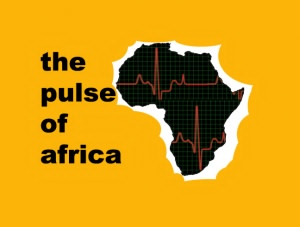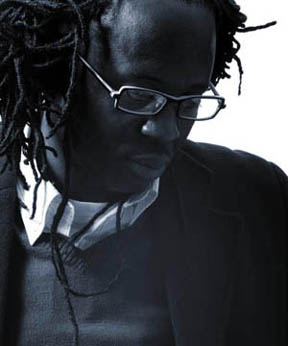This is the fifth blog in my series, The Pulse of Africa talking with Global Africans working in Africa and across the Diaspora. It takes an inside view on Africa's progress, issues on arts and culture, technology and opportunities in this decade. See the series here. Follow me on twitter with the tag: #pulseofafrica.

The Pulse of Africa designed by Atim Annette Oton
I first met Bongani Madondo in Brooklyn about 4 years ago; he was staying around the corner from my store, Calabar Imports on Washington Avenue. He was like a quiet storm. Smart, quirky and a talker for sure. And as like-minded Africans, we got to know each other over less than a week and talked for several days, immediately becoming friends. Kindred spirits - we still talk endlessly via email and Facebook. What I discovered was that Madondo is a South African journalist, writer and arts critic.
To be fair, he is a non-fiction author and a multi-award winning profile writer and multidisciplinary cultural commentator working across a variety of media. His work on music, inner city architecture, urban cultures, politics of style, visual and performance arts is highly respected within academia, mainline media and the streets. To put it lightly - he walks with depth and content. And most days, I respect his thoughts, for we think alike in the struggle for Global Africa.
He published a non-fiction collection - Hot Type: Artists, Icons and God-Figurines by Picador in 2007 and Music Safari: Contemporary History of South African Popular Song. He was a senior staff writer and resident critic at the Sunday Times Lifestyle section. His work, most famously Vanity Farce appeared in Transition Magazine, the official journal of the WEB Du Bois Institute of African American Studies at Harvard University. An editor-at-large London multidisciplinary culture journal, Shook, he's also written for City Press, Marie Claire, Best Life, Sunday World Mail and Guardian, and The Sunday Independent. As a music and political cultural writer, his has over the last two decades written about youth subversion, race matters, glossy media race-presentation and the political economy of style. Enough said.

Bongani Madondo, photo credit
Bongani is my South African friend: I call him my brother from another mother. We are kindred spirits, we think alike in many ways. And yes, he is a bit of a radical. Even from New York to South Africa, we continue our dialogue of changing things across Global Africa. So, when I asked him these 2 important questions about Africa, it was both easy for him to respond but it was difficult to edit himself. Bongani is truth, he says it as he means it. He is direct, brash and brazen. As a critic and writer, he is doing what he is best at: dissecting, identifying and diagnosing the truth.
1. How do you feel about Africa's progress and opportunities in your industry and city this decade (2010′s)?
I have always been terribly troubled [as well as, on occasion, inspired] by the world's media and others ways of looking at Africa as a single catchphrase: A collective. Homogenous. One black block of either violence, mediocrity, barbarism, or on the other hand, a condescending liberal anthropological of over celebrating certain quaint aspects of supposed discovery.
It goes like this: "Oh, they can use technology"!, "Oh, their music is so emotional and touching," "Oh here's the latest African corruption crime buster", "Oh, here look at this African he went to Harvard", and "Oh, they still live in poverty but so happy and pastoral..." I say b.s. to all that.
We need news ways of looking at Africa. Not even, the third way, no. Just a complex, simple and an accepting way of looking at Africa the way you would look at all continents, even then, it is hardly ever employed...people don't look at whole continents unless there's something supposedly sexy about them: Asian Tigers, or in literature: The new magic realists after Marquez...Oh, save me from that.
Nothing has changed.
All the major mainstream magazines have white editors, white owners, white sub-editors and managing editors and the like. Although I am inspired by a new wave of young techy black generation [completely apolitical, scant if any sense of history] but creating their own narratives as bloggers, twitteratti, designers, music, merchandising business, etc, especially the pop-cultural and IT fields, utilizing latest technology. Now I say that's what the real battle was all about: for our children to be able to compete and create their own realities.
Individual Africans making a living without economic borders
I am also loving the new Pan-Africanist small entrepreneur. He/She who is from Ghana and opens several Ghanaian/Senegalese/Ivorian/Eithiopian cuisine joints in Johannesburg, in Nairobi, in Kinshasa and still be back home in Kumasi or St. Louis in Senegal, or Abidjan in time to celebrate X-mas or whatever religious/sacred days with the whole clan, often a traveling clan itself.
I love African entrepreneurs not looking at the governments for any salvation at all, but are utilizing mobile technology, to make borders obsolete. The thing that still saddens me is that none of the major billion dollars mobile technology firms are owned by black Africans themselves: It is either by Vodafone [European] or a slew of competing big time operators owned by Arabs, Indians, Chinese or ol' money white South African entities.
2. What problems do you feel have to be overcomed by Africa in your industry?
I just think the publishing "space" should be forced to be conducive to the creation, promotion and prosperity of African/black voices and black owned media. In my case, I don't know a lot of African and black owned publications and radio/TV channels.
If and when they happen to be black, they are state owned [and you know what are the problems with state owned enterprises]; and if they are owned by independent entrepreneurs [Blink, Tribute magazine, etc], they are quickly shout out of business by the three or so traditionally white owned ol' big boys club media owners.
Basically things haven't changed that much in South African corporate sphere. Which is why you still hear such an integrationist Middle Class liberals like me still using quaint essentialist terms such as "white" and "black" instead of "South Africans"- because, go around and ask everyone, it's still that way in all aspects and spheres of life.
When the black government which has its hands tied in the back anyway, because of its own corrupt tendencies, and because it is beholden to bullying white media lobby groups and white media, tries to make a difference, they are met with stifling opposition and loudest, pre-emptive noise accusing it of reverse racism, which is of course the biggest pile of b.s. I have ever heard in any post-colonial setting] .
Back to the trades.
So, the existing advertising companies as well as clients themselves dish business to their old white clients/friends/ol' money network I guess it is human nature to deal with the tried and tested.
New media such as online space has not done pretty well in terms of serving as alternative advertising revenue for new black media, either. Although, I'm sure all of that will change and all old white traditional big walls will be circumvented or fall as more and more new markets and smart media owners from all walks of life utilize the growing benefits and possibilities of what online can/offers.
Ideally, South African needs its own Arise, Ebony, etc, and black owned radio channels. The other truth is - and this is pertinent and almost peculiar to South Africa than any other African country -black folks here, actually love the idea of "going to look for a job": code word for going to work for a white man. It is part of a legacy of Apartheid and the creation of new urban/industrialization of our country.
Madondo collaborated with the international Zulu rock star Busi Mhlongo by interpreting her sound in text and scripting the monograph booklet accompanying her swansong recording ―Amakholwa. In 2010 he co-wrote the hit musical revue' MaBrrr: The Musical which c hronicles the life, the time and the music of South Africa's music Icon Brenda Fassie and in 2011, he was appointed Chief Cultural Curator and Public Policy Adviser for the Annual South Africa Week event in Washington DC and New York City. He is currently collaborating with the black rock' n 'roll outfit Blk Jks, on a stage musical narrative on the routes of the guitar: How the West Was Won - The African Origins of Rock Music.
African needs thinkers to carve the change. Bongani Madondo thinks deeply. South Africans really needs to listen to the voice of his generation. Change is needed and it is time for the literary thinkers to run things.